Twenty-one RCAF volunteer fighter pilots were sent to Korea for F-86 combat duties and they served from March 1952 until November 1953 in small scheduled groups.
They flew exclusively with the USAF’s 4th Fighter Interceptor Wing at Kimpo (about 15 miles northwest of Seoul) or the 51st, at Suwon (some 24 kilometres south of Seoul). Both fighter interceptor wings had three fighter squadrons and Canadians served in all six of them. A few had extra duties at the wing level.
RCAF pilots served for six months or 50 combat missions, whichever came first. Fifty missions usually took three to four months. On arrival at their assigned squadron, pilots were usually given a short on-squadron introductory flying program called “Clobber College”. After that, they went into combat.
A combat mission usually consisted of flying about 322 kilometres over enemy territory to the infamous “MiG Alley” (near the Chinese border) area, patrolling, contacting and fighting with the communist’s MiG-15s, and returning home.
http://www.rcaf-arc.forces.gc.ca/en/his ... korea.page
S/L Andy McKenzie
F/L Ernie Glover shot down three MiG-15s.
It took him 10 years and two wars, but Canadian fighter pilot Omer Levesque finally got his fifth victory in the skies over Korea.
http://www.historynet.com/the-making-of-an-ace.htm
Flt. Lt. Lawrence (Larry) Spurr
S/L Doug Lindsay
https://www.spitfiremuseum.org.uk/pilotlindsay
F/L John MacKay
http://acesofww2.com/can/aces/mackay.htm
RCAF Pilots who flew in the Korean War
-
Ludford 101
- Endowed

- Posts: 76
- Joined: Wed Apr 18, 2018 12:15 pm
- Commendations: 9
Re: RCAF Pilots who flew in the Korean War
Andy McKenzie kept the fact that he had been shot down by a fellow flier until 1980 when he revealed it to John Picton of the Toronto Star.
I had the honour of knowing the man and spent a few afternoons with him and his wife, Joyce, at their farm outside of Ottawa. Joyce had some wonderful stories about telling Chou en Lai to "give me back my husband, his kids need him"
Wonderful people.
I had the honour of knowing the man and spent a few afternoons with him and his wife, Joyce, at their farm outside of Ottawa. Joyce had some wonderful stories about telling Chou en Lai to "give me back my husband, his kids need him"
Wonderful people.
-
Ludford 101
- Endowed

- Posts: 76
- Joined: Wed Apr 18, 2018 12:15 pm
- Commendations: 9
Re: RCAF Pilots who flew in the Korean War
https://ottawarewind.com/2015/11/09/bei ... n-war-ace/
BEING ERNEST: The Untold Story Of Ottawa’s Korean War Ace

Ernie Glover, an Ottawa based pilot flying American Sabre jets during the Korean War.
As another Remembrance Day approaches we reflect on those that served our country and sacrifices made throughout history’s conflicts. Yet often quietly and unintentionally overlooked are those that served in what has been dubbed The Forgotten War. A ghastly war that raged in the cold mountains of Korea from 1950 to 1953, it involved United Nations forces led by the United States against Communist forces of China and the Soviet Union. Almost 26,000 Canadians participated in the Korean War under UN command in both ground and naval combat roles with air combat limited to transport and supply missions. Well, sort of. It turns out that some Canadian fighter pilots with the Royal Canadian Air Force volunteered their services to the United States Air Force flying Canadian made Sabre jets against Soviet MIGs. One of these pilots was an Ottawa based fellow by the name of Ernest Glover, a man with a fascinating life story that I think needs to be told, a story that unfolds like a Hollywood film.
BEING ERNEST.
Ernest Arthur Glover grew up in Toronto and in 1940 at the age of 18 enlisted in the RCAF to serve his country during World War II, training near Hamilton to become a pilot. Ernie soon got a taste of the war being shipped to England where he was strapped into Hawker Hurricanes for night fighter missions.

Ernie Glover entered air combat during World War II flying night fighter missions in a Hawker Hurricane.
Gaining valuable combat experience in Hurricanes, Ernie soon moved into the more powerful and formidable Hawker Typhoon, flying fighter missions into occupied Europe. On one such mission in 1943 over France, Ernie was blasted by German flak that downed his Typhoon forcing him into the hands of the Germans and a Prisoner Of War.

Ernie found himself a PoW at a place called Stalag Luft III. This German PoW camp is better known as the site of The Great Escape and contained captured Allied airmen who worked tirelessly to tunnel their way out of the prison camp. Their exploits were made into a 1963 film starring Steve McQueen, “The Great Escape”. Ernie was present during the Great Escape but remained confined at Stalag Luft III until the end of the war.
After being liberated from Stalag Luft III Ernie returned to Canada where he worked for Dominion Bridge in Montreal. Ernie could not seem to keep his feet on the ground and in 1948 re-enlisted back into the RCAF and in 1951 came to Ottawa to fly the new Vampire jets stationed at Ottawa’s Uplands Air Force Base.
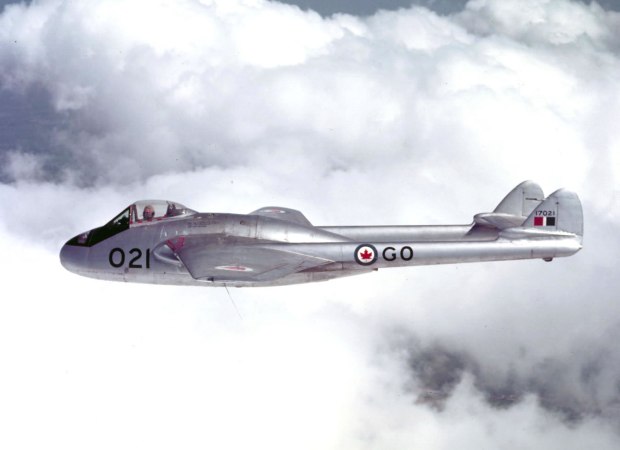
Upon being freed from prison camp in Germany, Ernie returned to Canada and in 1951 flew Vampire jets in Ottawa.
Mastering these new jet engined fighter craft, Ernie volunteered with 22 other RCAF pilots to join the Americans fighting in the skies above Korea. You see, the best fighter jet in the world at the time was the F-86 Sabre, and Canada was producing their own variant called the Canadair CF-86 built in Montreal, of which many were being sent to Korea for service with the USAF. RCAF pilots were unable to join the air battles over Korea in their own Canadian Sabres, but in 1952 as volunteers fighting under the American flag these 22 Canadian pilots got their wish to experience the mighty Sabre in combat. Ernie Glover was one of these eager pilots, and he joined the USAF 334th Fighter Squadron in Korea.
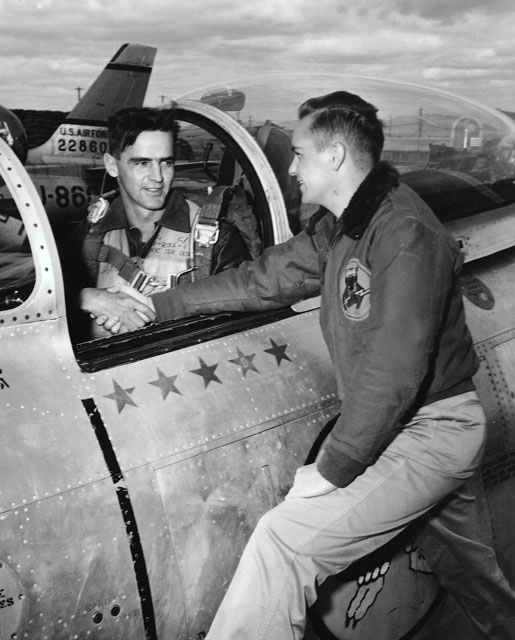
Ernie Glover (left) in the cockpit of a Sabre jet in Korea flying for the USAF. (photo:Legion Magazine)
Now in the Sabre, Ernie soon engaged Soviet made MIG fighters on an almost daily basis under treacherous flying conditions. Dog fighting in “MIG Alley”, a dangerous zone of air combat where the Sabres and MiGs would battle it out in what was to be the first large scale jet to jet aerial combat scenario, RCAF pilots in USAF marked Sabres flew over 900 combat missions with 9 confirmed MIG kills. Ernie happened to down 3 of those nine MIGs, the highest score of any RCAF pilot in Korea making him a distinguished combat pilot.
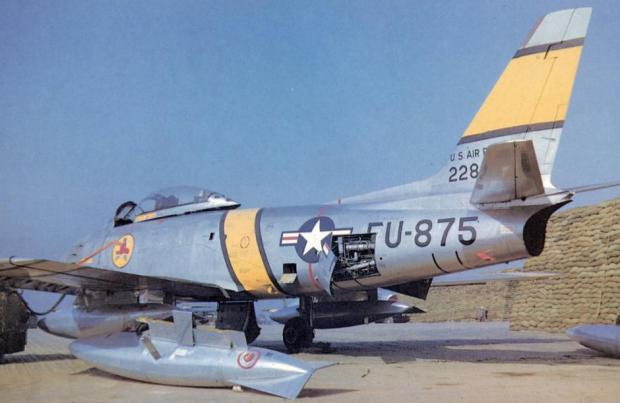
F-86 Sabre jet of the USAF 334th Squadron in Korea of which Glover flew 58 combat missions.
Ernie flew a total of 58 combat missions and the Americans recognized Ernie’s air combat skills in the Sabre and awarded him the American Distinguished Flying Cross, a medal reserved for those with “the Air Corps of the Army of the United States, who distinguishes himself, or herself by heroism or extraordinary achievement while participating in an aerial flight.” Ernie shared his American DFC with the likes of Jimmy Doolittle, Amelia Earhart, Buzz Aldrin, and John Glenn. Ernie was also awarded the Commonwealth Distinguished Flying Cross, the very last RCAF pilot to do so for his service in the skies over Korea.
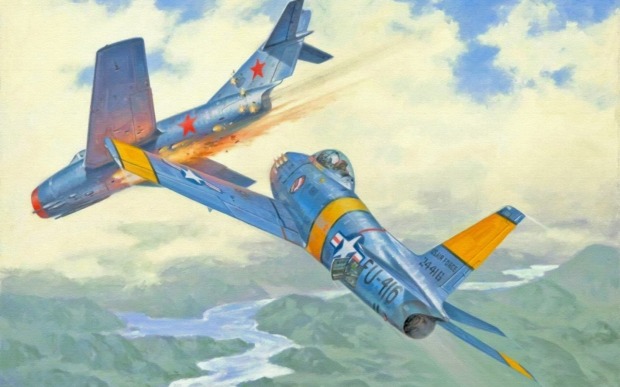
Ernie Glover shot down 3 MiG fighters and was awarded the Distinguished Flying Cross by the Americans for his service in Korea.
After completing his 58 missions in the American Sabres, Ernie returned to Ottawa to fly Canadian Sabres now outfitted to 422 Fighter Squadron at Uplands RCAF Air Base south of the city.
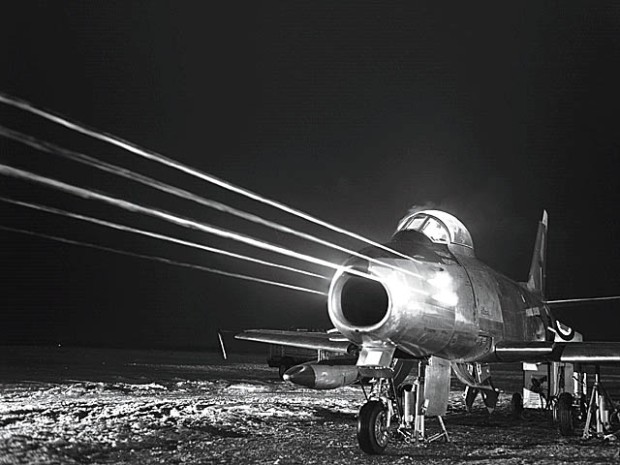
A Canadair CF-86 Sabre at Uplands Air Base in Ottawa.
Returning to the familiar cockpit of the Sabre in Ottawa, and almost 20 years after he was last there, Ernie re-visted the skies over Europe with the RCAF in Germany. Also flying other aircraft, Ernie was later stationed in Trenton, On where he finally retired from the RCAF in 1970 after 30 years of service.

A crashed CF-86 Sabre from Uplands that exploded after hitting the ground near Manotick.
Ernie left fighter jets to take on small town life in Frankford just north of Trenton. Having been a fighter pilot in World War II, shot down in Europe, a PoW in the Great Escape prison camp and a decorated Canadian Korean War air ace flying with the Americans, Ernie seemed almost invincible. Almost. Having survived all these battles, Ernest had one last battle to fight but was later admitted to hospital in 1991. Ernie Glover, the little known Ottawa ace, made a final flight to other skies on September 9th in a Belleville Hospital. His life’s journey was most definitely an earnest one.

Ernie Glover, the air ace from Ottawa.
BEING ERNEST: The Untold Story Of Ottawa’s Korean War Ace

Ernie Glover, an Ottawa based pilot flying American Sabre jets during the Korean War.
As another Remembrance Day approaches we reflect on those that served our country and sacrifices made throughout history’s conflicts. Yet often quietly and unintentionally overlooked are those that served in what has been dubbed The Forgotten War. A ghastly war that raged in the cold mountains of Korea from 1950 to 1953, it involved United Nations forces led by the United States against Communist forces of China and the Soviet Union. Almost 26,000 Canadians participated in the Korean War under UN command in both ground and naval combat roles with air combat limited to transport and supply missions. Well, sort of. It turns out that some Canadian fighter pilots with the Royal Canadian Air Force volunteered their services to the United States Air Force flying Canadian made Sabre jets against Soviet MIGs. One of these pilots was an Ottawa based fellow by the name of Ernest Glover, a man with a fascinating life story that I think needs to be told, a story that unfolds like a Hollywood film.
BEING ERNEST.
Ernest Arthur Glover grew up in Toronto and in 1940 at the age of 18 enlisted in the RCAF to serve his country during World War II, training near Hamilton to become a pilot. Ernie soon got a taste of the war being shipped to England where he was strapped into Hawker Hurricanes for night fighter missions.

Ernie Glover entered air combat during World War II flying night fighter missions in a Hawker Hurricane.
Gaining valuable combat experience in Hurricanes, Ernie soon moved into the more powerful and formidable Hawker Typhoon, flying fighter missions into occupied Europe. On one such mission in 1943 over France, Ernie was blasted by German flak that downed his Typhoon forcing him into the hands of the Germans and a Prisoner Of War.

Ernie found himself a PoW at a place called Stalag Luft III. This German PoW camp is better known as the site of The Great Escape and contained captured Allied airmen who worked tirelessly to tunnel their way out of the prison camp. Their exploits were made into a 1963 film starring Steve McQueen, “The Great Escape”. Ernie was present during the Great Escape but remained confined at Stalag Luft III until the end of the war.
After being liberated from Stalag Luft III Ernie returned to Canada where he worked for Dominion Bridge in Montreal. Ernie could not seem to keep his feet on the ground and in 1948 re-enlisted back into the RCAF and in 1951 came to Ottawa to fly the new Vampire jets stationed at Ottawa’s Uplands Air Force Base.

Upon being freed from prison camp in Germany, Ernie returned to Canada and in 1951 flew Vampire jets in Ottawa.
Mastering these new jet engined fighter craft, Ernie volunteered with 22 other RCAF pilots to join the Americans fighting in the skies above Korea. You see, the best fighter jet in the world at the time was the F-86 Sabre, and Canada was producing their own variant called the Canadair CF-86 built in Montreal, of which many were being sent to Korea for service with the USAF. RCAF pilots were unable to join the air battles over Korea in their own Canadian Sabres, but in 1952 as volunteers fighting under the American flag these 22 Canadian pilots got their wish to experience the mighty Sabre in combat. Ernie Glover was one of these eager pilots, and he joined the USAF 334th Fighter Squadron in Korea.

Ernie Glover (left) in the cockpit of a Sabre jet in Korea flying for the USAF. (photo:Legion Magazine)
Now in the Sabre, Ernie soon engaged Soviet made MIG fighters on an almost daily basis under treacherous flying conditions. Dog fighting in “MIG Alley”, a dangerous zone of air combat where the Sabres and MiGs would battle it out in what was to be the first large scale jet to jet aerial combat scenario, RCAF pilots in USAF marked Sabres flew over 900 combat missions with 9 confirmed MIG kills. Ernie happened to down 3 of those nine MIGs, the highest score of any RCAF pilot in Korea making him a distinguished combat pilot.

F-86 Sabre jet of the USAF 334th Squadron in Korea of which Glover flew 58 combat missions.
Ernie flew a total of 58 combat missions and the Americans recognized Ernie’s air combat skills in the Sabre and awarded him the American Distinguished Flying Cross, a medal reserved for those with “the Air Corps of the Army of the United States, who distinguishes himself, or herself by heroism or extraordinary achievement while participating in an aerial flight.” Ernie shared his American DFC with the likes of Jimmy Doolittle, Amelia Earhart, Buzz Aldrin, and John Glenn. Ernie was also awarded the Commonwealth Distinguished Flying Cross, the very last RCAF pilot to do so for his service in the skies over Korea.

Ernie Glover shot down 3 MiG fighters and was awarded the Distinguished Flying Cross by the Americans for his service in Korea.
After completing his 58 missions in the American Sabres, Ernie returned to Ottawa to fly Canadian Sabres now outfitted to 422 Fighter Squadron at Uplands RCAF Air Base south of the city.

A Canadair CF-86 Sabre at Uplands Air Base in Ottawa.
Returning to the familiar cockpit of the Sabre in Ottawa, and almost 20 years after he was last there, Ernie re-visted the skies over Europe with the RCAF in Germany. Also flying other aircraft, Ernie was later stationed in Trenton, On where he finally retired from the RCAF in 1970 after 30 years of service.

A crashed CF-86 Sabre from Uplands that exploded after hitting the ground near Manotick.
Ernie left fighter jets to take on small town life in Frankford just north of Trenton. Having been a fighter pilot in World War II, shot down in Europe, a PoW in the Great Escape prison camp and a decorated Canadian Korean War air ace flying with the Americans, Ernie seemed almost invincible. Almost. Having survived all these battles, Ernest had one last battle to fight but was later admitted to hospital in 1991. Ernie Glover, the little known Ottawa ace, made a final flight to other skies on September 9th in a Belleville Hospital. His life’s journey was most definitely an earnest one.

Ernie Glover, the air ace from Ottawa.
Re: RCAF Pilots who flew in the Korean War
Thanks for adding to the stories Ludford. I also found it fascinating that he was ALSO shot down in WW2, by American ground fire........to serve in TWO wars and be shot down by friendly fire in both is amazing.Ludford 101 wrote: ↑Wed Dec 05, 2018 3:43 pmAndy McKenzie kept the fact that he had been shot down by a fellow flier until 1980 when he revealed it to John Picton of the Toronto Star.
I had the honour of knowing the man and spent a few afternoons with him and his wife, Joyce, at their farm outside of Ottawa. Joyce had some wonderful stories about telling Chou en Lai to "give me back my husband, his kids need him"
Wonderful people.
Also, being kept as a prisoner of war 1 1/2 years AFTER the Korean War ended???
Please add on any other info on other flyer’s who participated.
Cheers
-
Ludford 101
- Endowed

- Posts: 76
- Joined: Wed Apr 18, 2018 12:15 pm
- Commendations: 9
Re: RCAF Pilots who flew in the Korean War
He told me he didn't think he was ever going to get out of China. There were four USAF fliers with him. All came home after him in 1955. I remember him talking about being in touch with all of them. Col Bud Mahurin, Captain Harold Fischer and 1st/Lt Roland Parks come to mind.
He let me run a tape recorder while we talked. I wish I could find those cassettes.
-
Ludford 101
- Endowed

- Posts: 76
- Joined: Wed Apr 18, 2018 12:15 pm
- Commendations: 9
Re: RCAF Pilots who flew in the Korean War
https://airandspace.si.edu/support/wall ... rance-rcaf

One of 22 Royal Canadian Air Force (RCAF) pilots on loan to the US Air Force in Korea, Flight Lieutenant Claude A LaFrance, as leader of a flight of 4 F-86 Sabre fighters, shot down a Mig-15 near Manchuria on 5 August 1952. At the time, Flight Lieutenant LaFrance was serving with 39th Fighter Interceptor Squadron, 51st Fighter Interceptor Wing. For this action and on return to Canada after 50 missions, he was awarded the Distinguished Flying Cross and the Air Medal. He continued his career as a fighter pilot and appointed commanding officer of Escadron Tactique de Combat 433, commanding officer of Canadian Forces Base Winnipeg, Director General of Plans and Policy at NDHQ, commanding officer of 10 Tactical Air Group (army support) and Chief of Plans, Policy and Programs at NORAD HQ. He retired from the Canadian Forces in 1981 after 34 years of service in the rank of Major General. He has accumulated 5000 flying hours in more than 35 different types of fixed and rotary wing aircraft.
From 1985 to 1989, he was Assistant Deputy Minister Aviation in Transport Canada, responsible for the technical and operational control of civil aviation in Canada. Later, as a consultant in international aeronautics, he led multidisciplinary teams to develop national systems for the control of civil aviation in Albania and Lebanon under mandates from the International Civil Aviation Organization (ICAO). In 1994, he became President of Aerospatiale Canada Inc. which later became EADS Canada Inc. and retired from that position in 2005. He was inducted in the French Légion dHonneur in the rank of Chevalier. He served on the boards of the Canadian Battlefields Foundation for which he was Senior VP and Chairman of the Trustees Committee and Unmanned Systems Canada (USC) as Chairman of the Strategic Planning Committee. He belonged to the Defence and Civil Aviation committees of the Aerospace Industries Association of Canada (AIAC) and to the French Académie de lAir et de lEspace. He passed away peacefully in Cornwall, Ontario, Canada on 6 July 2014 at the age of 85.

One of 22 Royal Canadian Air Force (RCAF) pilots on loan to the US Air Force in Korea, Flight Lieutenant Claude A LaFrance, as leader of a flight of 4 F-86 Sabre fighters, shot down a Mig-15 near Manchuria on 5 August 1952. At the time, Flight Lieutenant LaFrance was serving with 39th Fighter Interceptor Squadron, 51st Fighter Interceptor Wing. For this action and on return to Canada after 50 missions, he was awarded the Distinguished Flying Cross and the Air Medal. He continued his career as a fighter pilot and appointed commanding officer of Escadron Tactique de Combat 433, commanding officer of Canadian Forces Base Winnipeg, Director General of Plans and Policy at NDHQ, commanding officer of 10 Tactical Air Group (army support) and Chief of Plans, Policy and Programs at NORAD HQ. He retired from the Canadian Forces in 1981 after 34 years of service in the rank of Major General. He has accumulated 5000 flying hours in more than 35 different types of fixed and rotary wing aircraft.
From 1985 to 1989, he was Assistant Deputy Minister Aviation in Transport Canada, responsible for the technical and operational control of civil aviation in Canada. Later, as a consultant in international aeronautics, he led multidisciplinary teams to develop national systems for the control of civil aviation in Albania and Lebanon under mandates from the International Civil Aviation Organization (ICAO). In 1994, he became President of Aerospatiale Canada Inc. which later became EADS Canada Inc. and retired from that position in 2005. He was inducted in the French Légion dHonneur in the rank of Chevalier. He served on the boards of the Canadian Battlefields Foundation for which he was Senior VP and Chairman of the Trustees Committee and Unmanned Systems Canada (USC) as Chairman of the Strategic Planning Committee. He belonged to the Defence and Civil Aviation committees of the Aerospace Industries Association of Canada (AIAC) and to the French Académie de lAir et de lEspace. He passed away peacefully in Cornwall, Ontario, Canada on 6 July 2014 at the age of 85.
